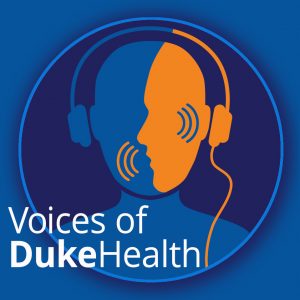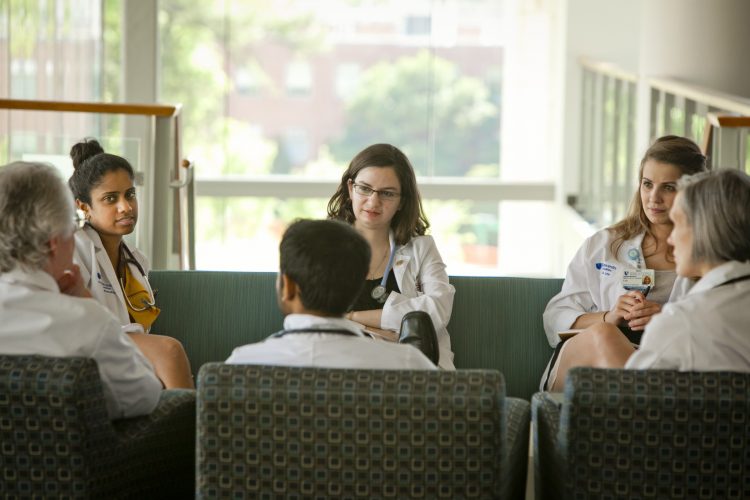The Problem

The 2016 Duke Health strategic planning framework, Advancing Health Together, identified a goal of sustaining Duke as a “place where everyone thrives and is valued.” The annual work culture survey has indicated high levels of employee satisfaction, but feelings of stress and burnout are evident, and the institution is committing resources to finding effective ways to strengthen resiliency. It seems to be early days for these efforts, but it is clear we must find ways to communicate success stories and hear from colleagues who have found effective ways to muscle through the stresses of working in health care.
It is good to listen to people tell their stories, and to hear others talk about the experiences that drive medicine and science forward. We believe it is important to facilitate and record these stories and to use them to build the resiliency of the workforce and the satisfaction of our patients. We want people—staff and visitor alike—to leave Duke Health thinking, “They listened to me.”
Our Solution
Our solution was to propose the Voices of Duke Health listening booth to provide a physical place where Duke Health makes explicit a commitment to listen. In the listening booth, we aimed to provide a dedicated space where patients, family members, visitors, students, trainees, and medical professionals could schedule time for facilitated conversations.
We wanted to record these conversations and share the voices, stories, conversations, and lessons in a publicly available series of audio episodes (a podcast). This podcast would thereby demonstrate how the institution listens to our people and celebrates their experiences, expertise, and insights. We hoped the podcast episodes would reflect inter-professional connections and a culture of professionalism and teamwork as well as highlight positive emotions and healthy habits.
Our goal with this project was to show patients, their families, and our colleagues that we value all who come to Duke and appreciate their life experiences.
We borrowed the waiting room within the Duke Medicine Pavilion Patient Resource Center to create the Voices of Duke Health listening booth. In there, we set up a temporary recording studio with a table and chairs, quality microphones and recording equipment, and materials to inspire meaningful conversations. (See photos above.) We recorded 25 conversations, from which Susannah and Karishma produced 15 engaging podcast episodes.
We also took our mobile recording cart into the medical center hallways and to various department and alumni events. For this, we asked a “question of the day” (along with the backup question “For what are you most grateful?”). At one of the first of these, we recorded a heartfelt response from the mother of a pediatric patient, and that audio from Shawn Burrow was one of our most effective examples of the power of this project. While these mobile-recording events did give the Voices of Duke Health project exposure, we found that the impromptu nature of a hallway interview gave mostly superficial answers.
produced 15 engaging podcast episodes.
To promote Voices of Duke Health, we produced posters, stickers, pins, window treatment, and stress balls. Susannah and Karishma managed social media accounts (@DukeVoices) on Twitter and Instagram, and we used the @DukeMedicine and our personal Twitter accounts to highlight the podcast.
Impact
We recorded 25 conversations; all of the participants provided their consent for use of their recordings for a public podcast.
By The Numbers
| Voices recorded in listening booth conversations and mobile recording cart events | 150 |
| Conversations in the listening booth | 25 |
| Voices in listening booth conversations | 57 |
| Mobile recording card events | 9 |
| Voices recorded at mobile recording cart events | 93 |
| Number of podcast episodes | 15 |
| Total listensas of April 25, 2019 | 7,004 |
We produced 15 episodes for the podcast and published the episodes with the online platform SoundCloud; the podcast was available through most podcast directories. Each week, we posted a one-minute teaser about the conversation to be featured that week. The full episode was published on Thursday afternoons, with an episode-specific page on the website that included the embedded SoundCloud player, a full transcript, and additional resources related to Duke resources or national health advocacy groups (CPR, strokes, diabetes).
Feedback
We asked participants in the listening booth to complete a post-conversation feedback form to assess their state of well-being and burnout and how their feelings after the listening booth session. A quarter of respondents indicated feelings of burnout, reflecting that participants were selected for their awareness and strategies toward burnout. All respondents expressed satisfaction with their listening-booth conversation. See below for the full feedback report.
Additionally, we collected feedback through email, social media, and our own conversations. Episode 10 was a particularly powerful episode, and we received many comments, including these messages:
Other Outputs
During the project, we fielded requests for assistance and/or guidance from Duke colleagues and units working on audio projects or interested in interviewing event attendees. We offered our audio production services to these groups:
- Department of Obstetrics and Gynecology for the alumni gala
- School of Medicine dean’s office for the From One Duke to Another podcast
- School of Medicine for the annual Medical Alumni Weekend
- Healthy Duke Fulfillment and Purpose working group
- Internal Medicine Residency Program and Durham VA Medical Center
Laura Caputo, MD, came to us for guidance on a podcast project she was starting at the Durham VA Medical Center. We offered our production services, which allowed Dr. Caputo to focus her efforts on recruiting her colleagues to participate. “Susannah is incredibly skilled in modern media, and her expertise has taken our podcast project to a level of professionalism that we could not have achieved without her. She is both knowledgeable and dependable, and would be an invaluable permanent resource for any public relations department. Additionally, Susannah’s involvement has given the project credibility and increased participation from faculty.”
Recognition
Voices of Duke Health was featured in a session at the AAMC Group on Institutional Advancement annual meeting (April 2019) called Best Practices in Digital Storytelling from Around the GIA. We intend to submit the project to the 2020 GIA Awards of Achievement.
Voices of Duke Health was selected as one of the eight winners in the ABIM Foundation’s inaugural Trust Practice Challenge (https://abimfoundation.org/what-we-do/initiatives/trust-practice-challenge). Anton has been invited to attend the Foundation’s 2019 Forum, [Re]Building Trust: A Path Forward (August 2019) to present our project in a short plenary meeting entitled “Innovations: Practices That Build Trust.” In addition, the project will be featured in a compendium of noteworthy trust practices.



